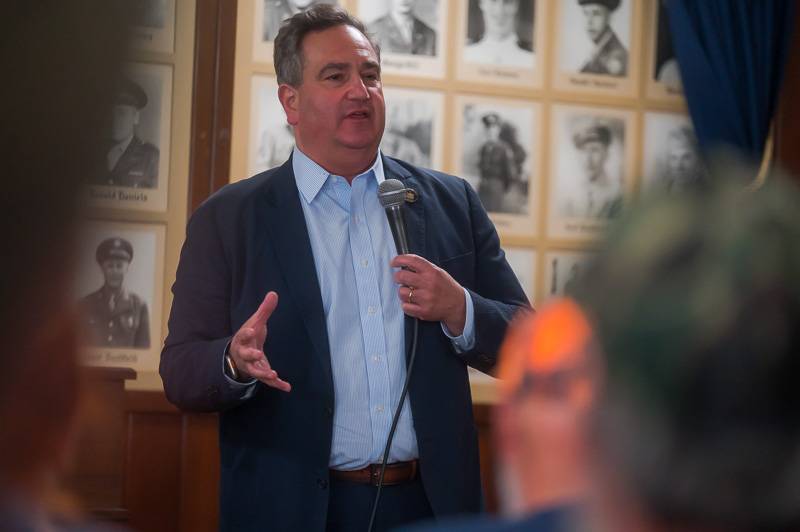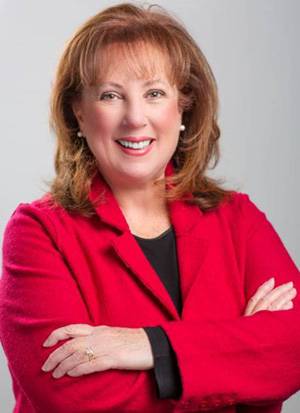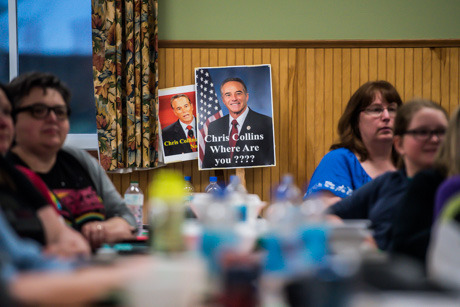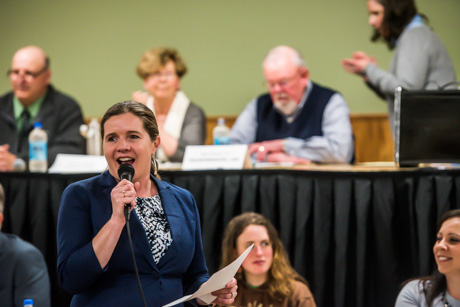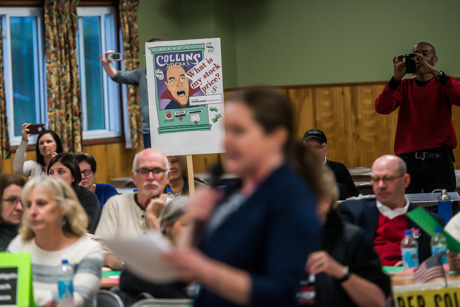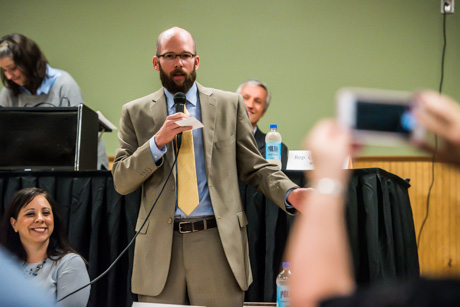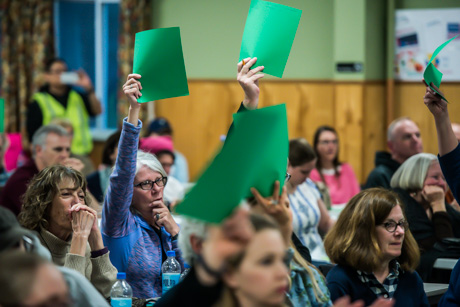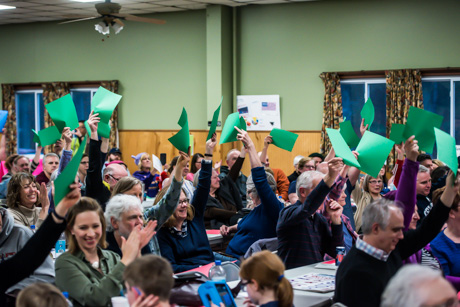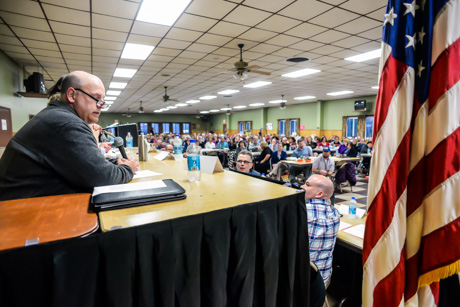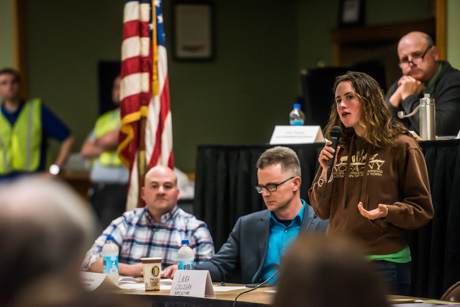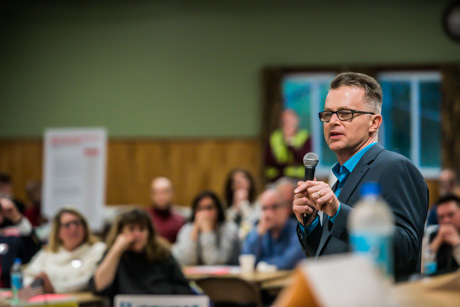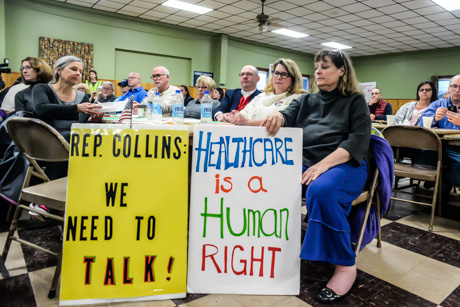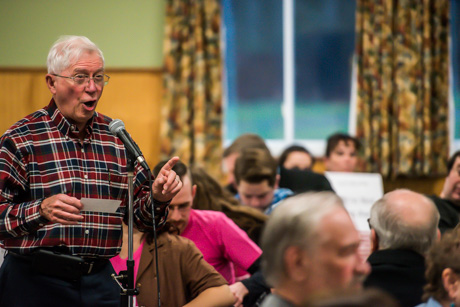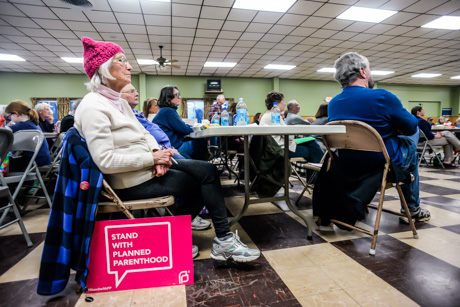Concerned Citizens town hall packs community center from NY-24 residents
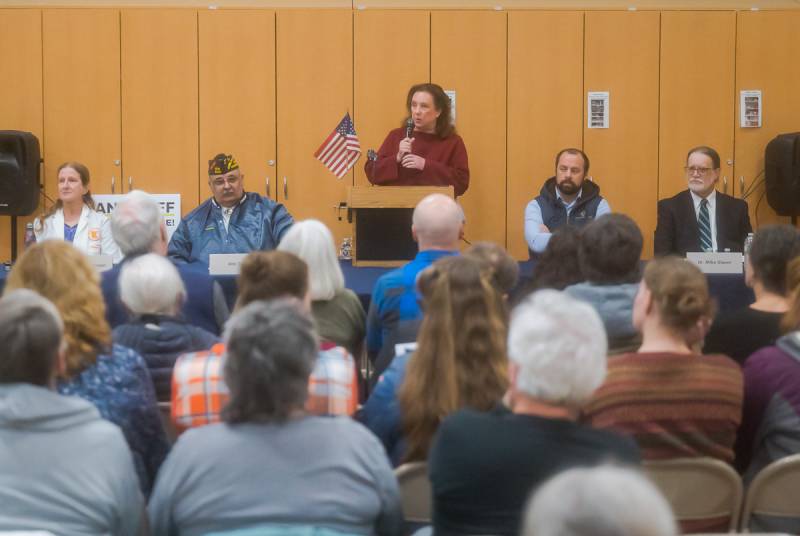
Photo by Howard Owens
Stafford resident Beth Carr appreciated skimming the faces and hearing from fellow attendees at a town hall Tuesday evening, she said, though she wasn't so certain about organizer Diana Kastenbaum's remarks that people still have free speech.
As an example, the White House administration and President Donald Trump have restricted certain rights by not allowing the Associated Press into portions of White House press meetings and onto Air Force One, she said, and “they can only come on if they agree with him.”
“I don't know if everybody here is obsessed with the news as much as I am, but we also have lost Voice of America. I was married to a veteran; I lived overseas. I listened when I lived overseas to Voice of America. It was unbiased reporting and essential in this world, across barriers and across lines on maps so that people could listen to news that maybe did not have free speech. And so I am afraid that free speech is eroding and is a threat," Carr said during the Concerned Citizens NY-24 Town Hall. "Which leads me to Dr. Glover, because in light of this erosion of free speech, isn't that what's happening on university campuses? Students getting up and protesting are being threatened for their exercise of free speech, and I'd like you to address that and the impact of this on campuses like Columbia and Harvard."
Carr directed her question to Michael Glover, a retired longtime educator and administrator perhaps best known here as the district superintendent of Genesee Valley BOCES for 10 years.
"What you hit upon is that we've moved from a question of free speech to the Thought Police. So just tonight, before coming over here, I saw where the president had threatened Harvard with the removal of its nonprofit status because they did not bend the knee, at least thus far, to the demands of the administration to drop their DEI programs and to monitor student speech," Glover said. "So you know, universities have always been bastions of free speech.
"They need to remain so. But I'm even concerned about my colleagues who are superintendents of schools in your local school districts," he said. "They are being targeted in a highly politicized environment. It's a very tough time in education. But I think to your point, it's more important than ever to speak up and to not give in to this kind of authoritarian threat."
Glover was a panel member for the town hall, which drew about 280 people from various counties within the NY-24 district. Erie County Executive Mark Poloncarz also attended the event and was singled out by Carr and others as the only elected official there. Congresswoman Claudia Tenney was invited but did not attend. Her cardboard cutout, used for other no-show events, was placed at the end of the panel row.
Issues ranged from cutting the federal Education Department, reducing Medicaid and Medicare, and the deportation of migrant farm workers and other immigrants to cuts in aid to food banks, healthcare, and how to best respond to and support what matters to folks.
Maria Bucci of Canandaigua County wanted to know, “What can we as citizens do to support farmers and build a strong workforce?”
Chris Noble, a seventh-generation farmer from Noblehurst Farms in Pavilion, said immigration is not a local or state issue but is in federal hands.
“The only way I think we can really impact the discussion is through our representatives, and so reaching out to representatives through email, phone calls, mass letters, whatever you can do to express your opinion on the matter is the most direct way,” Noble said. “Other than that, it's really trying to build a coalition that can help really affect the conversation. Us here in Western New York, we have a lot of diversity of farms, dairy, fruits, wine, processing vegetables. We relied upon foreign born workers for many years.”
Rev. James Renfrew of Clarendon painted the picture of local deportations happening and said, “I don’t know how agriculture will really continue in these areas.” Kastenbaum added that “we had heard that when ICE was coming in, the local sheriffs would have to comply with ICE directives. Are you concerned, if somebody came on your property, what would you do?”
Noble has not thought about such a “doomsday scenario,” he said.
“The number one thing, as the law states today, is that ICE, which is Integrations and Customs Enforcement, cannot enter private property by the warrants. So warrant means there's some activity or something that's gone on in the past or currently on your property that they are there to address, and beyond that, they cannot enter your property,” he said. “So I guess you can feel safe in the fact that there's that protection of the law that we can then rest upon, so we can affect our own property, of course, but beyond that, it depends on the federal authorities. So in terms of the impacts, it would be devastating, I would say, especially for the skilled nature of the labor. But I guess I don't know what that could look like.”
Jim Neider, a Vietnam-era veteran and 30-plus-year retired educator, said the same chainsaw that’s been used in other departments has also been let loose on Veterans Affairs, with “a little over 17% of the workforce” cut. The first cuts were to the veteran's suicide hotline, he said to a gasping audience.
“How does anybody in their right mind think that’s ok?” he said, prompting an enthusiastic round of applause.
Panel member Abe Zino said that the VA is lobbying for things to protect veterans, such as medication.
“I don't know if anybody realizes it. When you go to the VA home here in Batavia, the VA doesn't pay for your medication anymore. So now we’ve got to struggle to get the veterans the meds that they need. So we're trying to pass federal legislation to take care of those little things,” he said. “And we're also trying to help veterans who are in nursing homes that rely on Medicaid and Medicare because when you go in a nursing home, the fees could be anywhere from $5,000 to $10,000, and if you need specialized care, that's even more expensive. So just some things to think about.”
Dr. Laurel Dallmeyer, a panelist representing healthcare, didn’t mince words about how she felt about the direction of her field lately. She has seen patients stockpile meds in case of coverage reductions or bans, fear, and concerns by segments of the population and has even signed up to help out Strong’s trans care in the face of DEI targeting.
“This is one of the times when I say cruelty is the point,” she said in response to a speaker wanting to know what to do if her meds are taken away or not covered because of White House changes. “As a physician, I had to, like representative Tenney, swear an oath. And my oath was not to the Constitution, but it was to serve my patients and protect them. As many of you probably know, the Hippocratic Oath starts with first do no harm. And I would just like to point out that these cuts that are being proposed, and indeed some have been enacted into law already are going to do nothing but harm people of this district and this country, and that's why I've come out of the exam room to help fight for my patients and the people that I believe are being harmed in this district."
She later said that she "was horrified" when there wasn’t more of an outcry against Robert F. Kennedy Jr. being named as Health and Human Services secretary.
A number of people had concerns about what would happen to their local schools if and when the U.S. Education Department is eliminated. What does that actually mean? As programs are reduced at the federal or state levels, localities are left to fill those gaps, Glover said.
More than a dozen years ago he was speaking similar words, reminding the public of financial shortfalls that would affect rural — “low wealth” — districts the most. Free and reduced lunches, extracurriculars, programs for special needs students are just some of the potential items up for cuts. Revenue was not keeping up with increased costs, he said then, and is still repeating the same warning, though with perhaps more of a federal accent.
“Public schools should provide an equal opportunity for success,” he said. “The local schools will have to tighten up and do more with less. As time goes on, they will have to do less with less, and children will suffer.”
He emphasized that there’s a crisis in education because there’s not enough educators to do the jobs needed, teacher education programs are shrinking and an increasing demand is being met with a lower supply.
“And at the cabinet level, there will no longer be a voice in the cabinet,” he said.
Joy Hammond of Bergen asked about food banks and pantries and how FDA cuts will affect those programs. Poloncarz said a $3.5 million cut, effective in May, will especially impact fresh foods from farmers for Meals on Wheels programs—something that Noble himself is worried about for his grandmother.
Since food pantries don’t deal so much with these types of fresh foods, they may not be quite as affected, Poloncarz said. But if your local food bank has lost funding and these direct resources, obviously it’s going to matter.
“A decision in Washington is affecting the local community,” he said. “You don’t want anyone going to bed hungry in your community.”
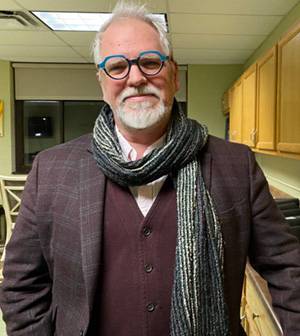
Photo by Joanne Beck
Chris Bennem and his wife came from South Bristol to attend their second town hall, the first being in Geneva. It was worth the trip, he said.
"I thought it was really important for us to hear from, if not public officials that are elected, then public citizens who want to represent those of us who are residents of this area to talk and have an open discourse on the issues that affect all of us based on recent legislation that's been proposed and what DoGE has been doing," he said. "I did attend one in Geneva by a similar group that was wholly focused on healthcare, and that was really helpful. But I wanted to hear more. There are so many things being affected. This has been really effective and eye-opening. Certainly, the statements on education and free speech absolutely hit home for me.
"One topic that didn't come up, I thought about getting in line, but it was a little late, is the issue of book banning that's happening throughout the country, and the fact that things are being removed from federal libraries, whether they're military libraries and other libraries," he said. "So I am a big free speech person. I was in publishing for years, so this is not a good development in our country."
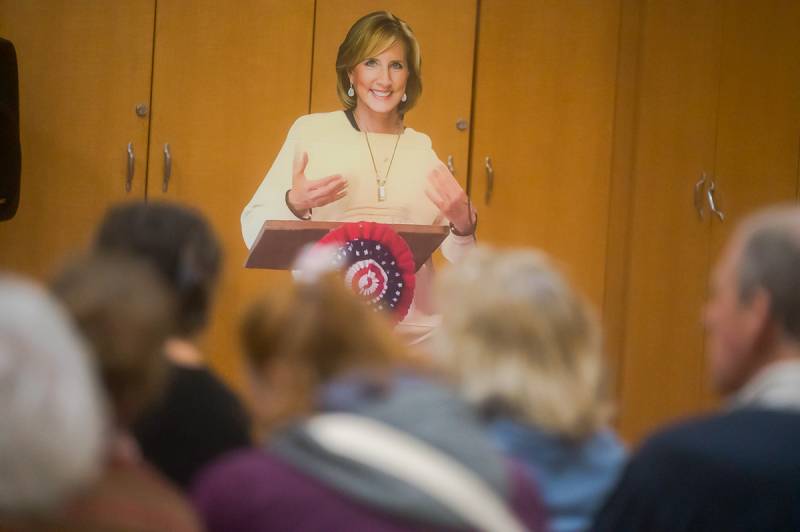
Photo by Howard Owens
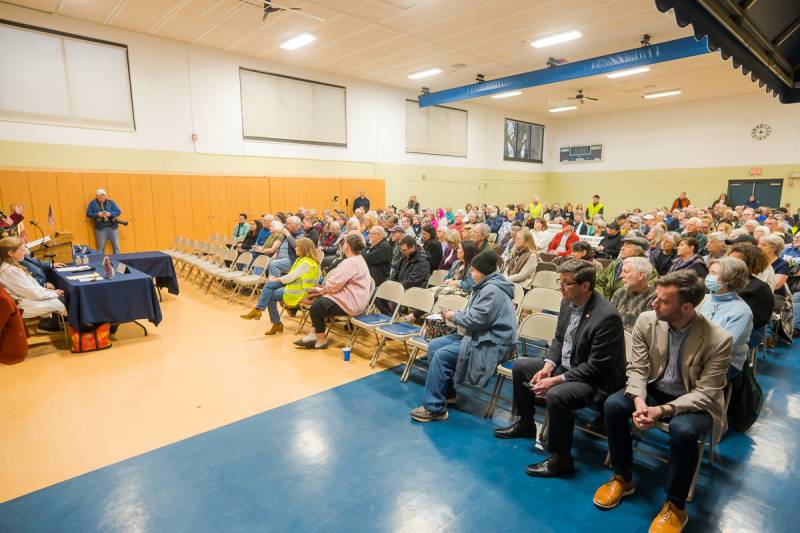
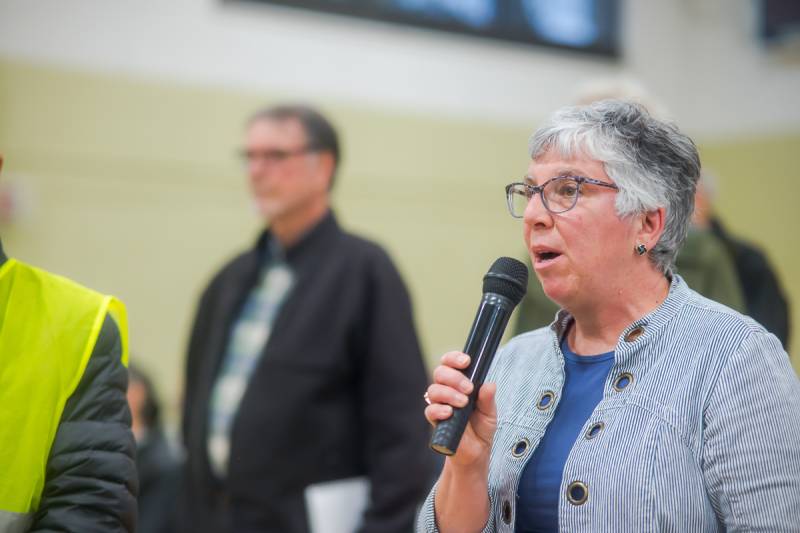
Photo by Howard Owens
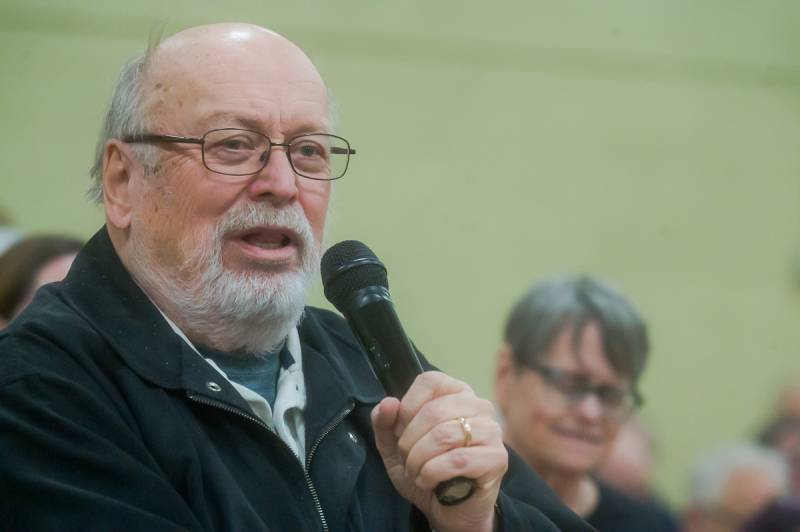
Photo by Howard Owens
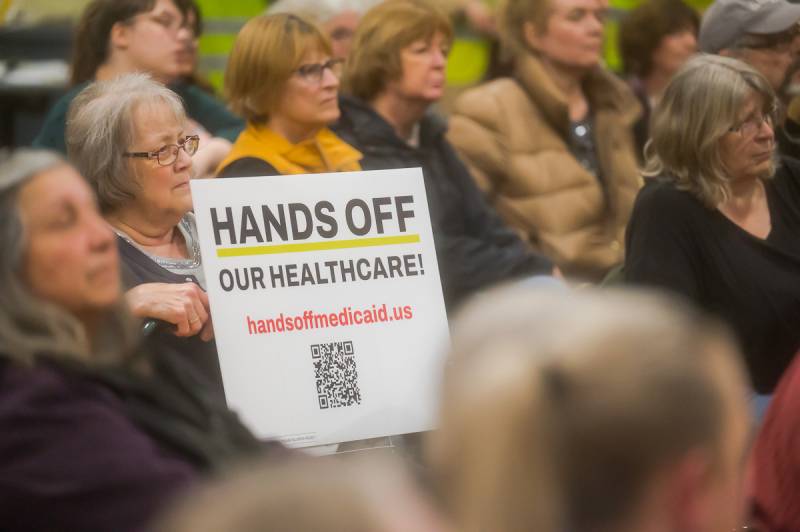
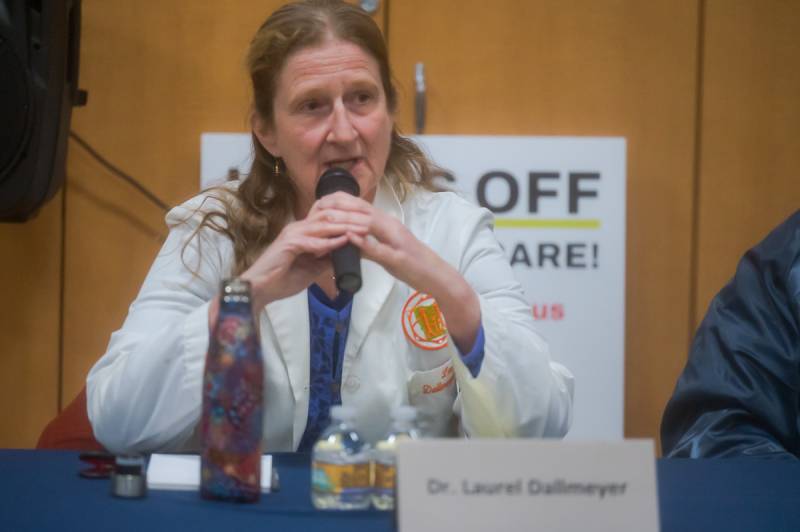
Photo by Howard Owens
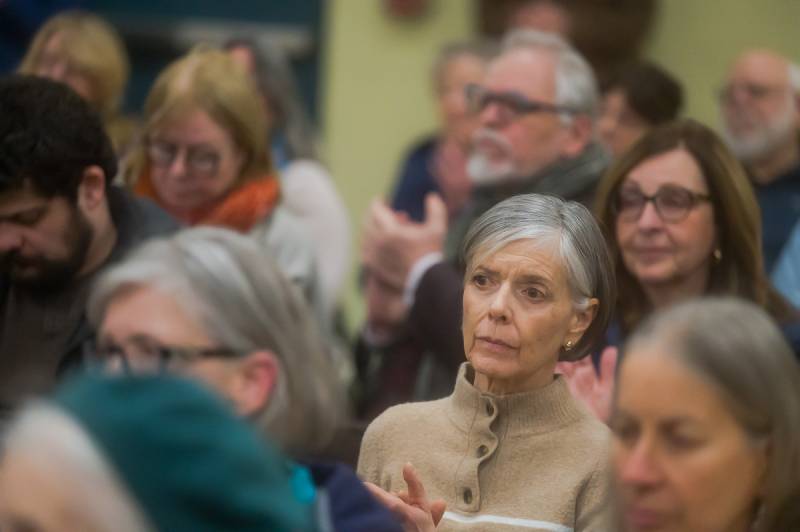
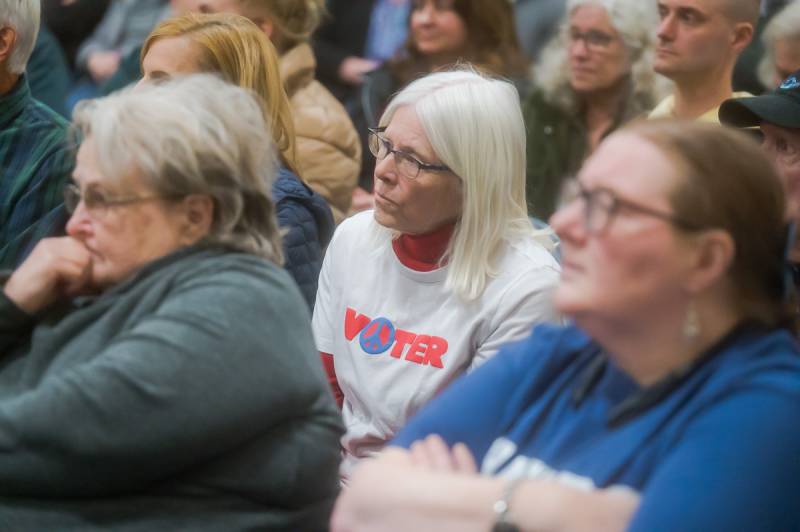
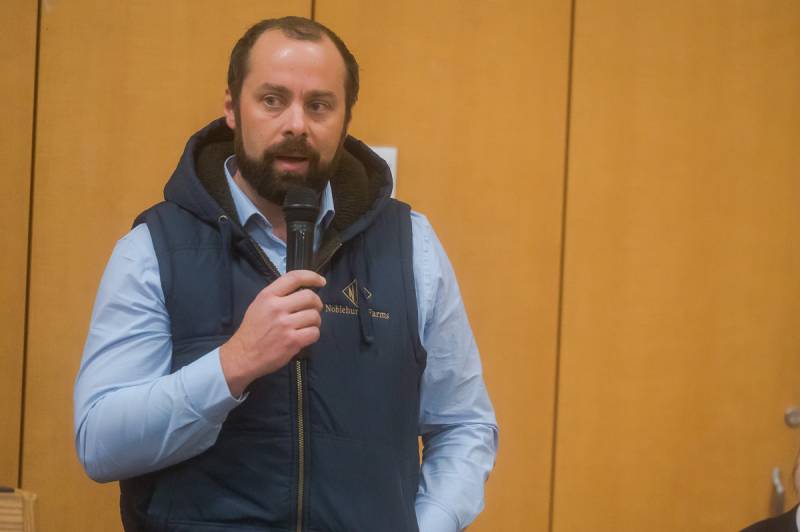
Photo by Howard Owens
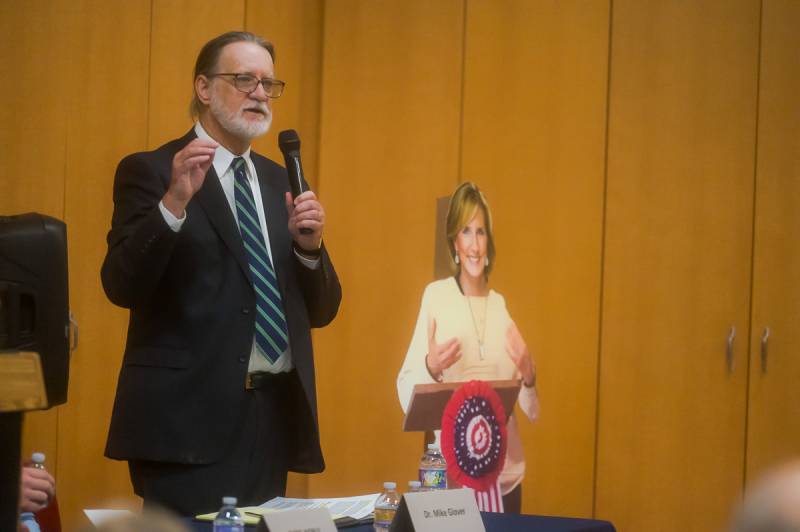
Photo by Howard Owens
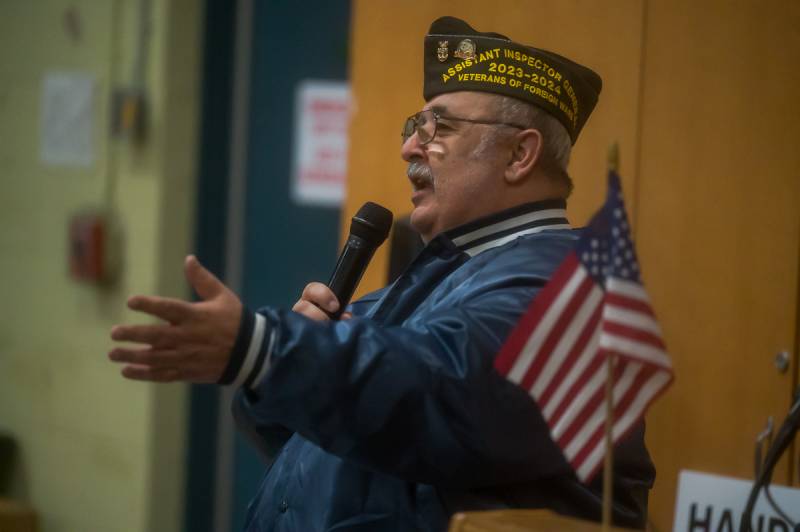
Photo by Howard Owens
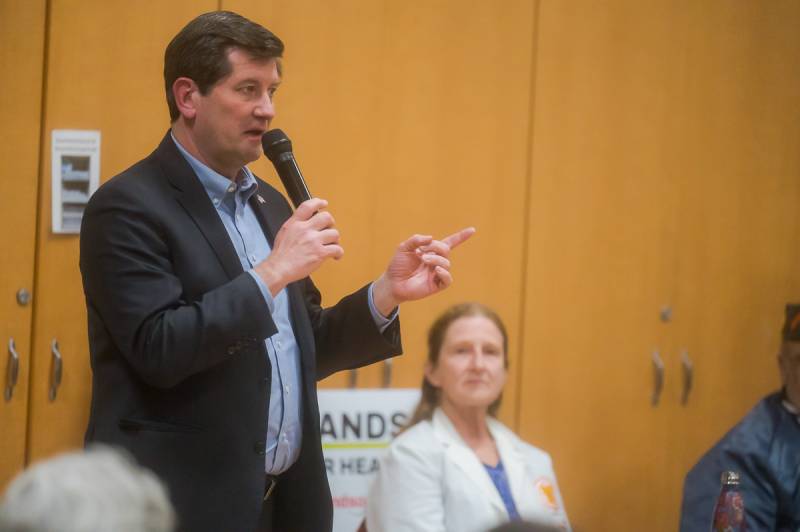
Photo by Howard Owens

